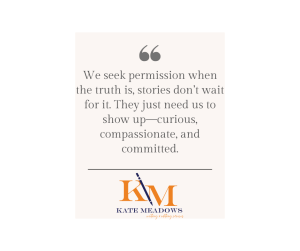When Stories Save Us: Notes from the 2025 South Dakota Festival of Books
In a time of uncertainty—for journalism, for truth, even for funding the arts—stories endure because people keep showing up with curiosity, compassion, and commitment to telling them.
That truth was on full display at the 2025 South Dakota Festival of Books, held September 26–28 in Spearfish. The South Dakota Humanities Council describes the festival as “the state’s premier literary event,” celebrating literature “in South Dakota and beyond by connecting the very best regional and national writers with our state’s readers for conversations, presentations, panel discussions, book signings, and special events.”
More than 5,000 book lovers, authors, and publishing professionals filled the small town (population just shy of 14,000) for a weekend that celebrated the written word against all odds.
Five months before the festival, the South Dakota Humanities Council, which organizes the event, lost 74 percent of its funding due to deep cuts to the National Endowment for the Humanities. Then, in a twist worthy of a novel, the festival’s main book distributor backed out at the last minute—leaving organizers scrambling.
Enter Henry’s Books, Spearfish’s lone independent bookstore. Opened just a year earlier through a massive crowdfunding effort, Henry’s stepped in, secured every title from the 60-plus featured authors and illustrators, and quite literally saved the festival.
It was a reminder that stories survive only because people see to it that they do.
Unresolved
At one session, journalists-turned-authors Dan Jorgensen and Mary Annette Pember explored the crossovers between journalism, narrative, and creative writing. Playing on H.L. Mencken’s line that “the journalist lives a life of kings,” Pember said she liked to think that, as a journalist, she lived “the life of queens.”
As she spoke about researching her mother’s experience at an Indian boarding school in Wisconsin—material that went into her latest book, Medicine River—one word came to me: unresolved.
History is unresolved.
Our stories are unresolved.
So much of our reckoning with hard truths remains unresolved.
Listening to Pember and Jorgensen, I couldn’t help but wonder if either of them would go into journalism today. The world they entered decades ago—the one I once knew—has changed beyond recognition. I remembered myself in those early days, heading out in Little Henry, my blue 1990 Ford Ranger, reporter’s notebook in hand. I’d chase the story, scribbling facts and quotes, then return to the newsroom to type and send my piece to the editor. My first salaried job paid $24,000 a year.
Today, reporters type notes into their phones and sometimes file stories from the driver’s seat before even leaving the scene. The tools have changed, but the motivation—the why behind the work—still matters most.
Pember admitted that “structure was always the stumbling block.” And her reason for writing her latest book felt familiar: “Part of my motivation was trying to understand my family,” she said. Even after publication, she said, she keeps a pen and pad nearby, giving herself permission to remember.
Permission. That word lingered.
Another phrase came to me that morning: consistent curiosity. Maybe that’s what keeps a journalist—or any writer—at the desk, even when the story feels too heavy, too tangled, or too unresolved.
Stories Truer Than Facts
Later, in a session called Mending a Divided Nation, psychology professor Tania Israel presented hard statistics about how Americans misperceive one another.
“We perceive Democrats and Republicans to be farther apart than they are,” she said. “We’re not nearly as apart as we think we are.”
She shared some sobering numbers:
Republicans guessed that 38% of Democrats identify as LGB (lesbian, gay or bi-sexual); the reality is 6% of Democrats identify as such.Democrats guessed that 44% of Republicans earn more than $250,000; the reality is 2% earn more than $250,000.Each side assumes 40% of the other condones political violence, when in truth, only 1–2% do.But here was the hopeful part: 71% of Americans believe it’s possible to find common ground on most issues.
And then Israel said something that resonated with me on a deep level: “People find stories to be more true than facts.”
It was another thread in that same tapestry—curiosity, compassion, and story as the bridge between worlds.
One festival attendee said this about the power of story: “Stories are alive after we let them go. You don’t know who’s going to read them, and you don’t know what kind of effect they’ll have.”
The Writer’s Reckoning
 The next day, I sat in a dim theater at Black Hills State University, attending yet another talk on researching and writing nonfiction. I’d hoped for some new insight into how to approach my own project about my grandfather’s childhood—his journey from Dust-Bowl-ridden Oklahoma to the far reaches of western Wyoming in the late 1930s.
The next day, I sat in a dim theater at Black Hills State University, attending yet another talk on researching and writing nonfiction. I’d hoped for some new insight into how to approach my own project about my grandfather’s childhood—his journey from Dust-Bowl-ridden Oklahoma to the far reaches of western Wyoming in the late 1930s.
But as the speakers traded anecdotes about their own research with their own books, I realized: Nothing that they were saying was new to me.
And then it hit me. I was hiding behind “learning.” Behind more classes, more talks, more knowledge. What I wasn’t doing was the one thing that mattered most: writing.
It’s funny how easy it is to give two hours to a talk about writing and not even consider spending those same two hours actually writing.
I jotted this in my journal: A big part of why I’m not writing—or researching—is that I don’t feel I have permission.
Of course, the question then becomes, permission from whom?
And of course, I know the answer: permission from myself.
Maybe that’s the struggle for so many of us. We seek permission when the truth is, stories don’t wait for it. They just need us to show up—curious, compassionate, and committed.
The Story That Endures
As I packed up my vendor booth at the end of the weekend, I kept thinking about Henry’s Books—how one independent bookstore rose to meet the moment and, in doing so, reminded us all why we gather around stories in the first place.
Because when we show up for stories, they show up for us.
When we nurture curiosity, we mend what feels broken.
And when the world feels uncertain, stories remind us that the human spirit endures.
For me as a writer, editor, and book coach, weekends like this are a powerful reminder of why we do what we do. Every author I help, every story I edit, is part of this larger human effort—to make sense of what’s unresolved, to stay curious, to keep the flame of story burning.
Because in the end, it isn’t just books that save festivals—it’s people showing up for one another, for story, for truth. And that, I think, is where hope lives.
As I drove home from Spearfish, I thought about how every story I help shepherd into the world—whether my own or someone else’s—is part of this same act of endurance. Writers, editors, readers, booksellers—we all hold a thread of it. What Henry’s Books did for the Festival is what writers do every day: keep stories alive.
That’s the work, and the gift—to keep showing up with curiosity, compassion, and commitment, knowing that even in uncertain times, stories will carry us through.
*This post contains affiliate links, and we receive a small commission from each book sale.
The post When Stories Save Us: Notes from the 2025 South Dakota Festival of Books appeared first on Kate Meadows Writing & Editing.



